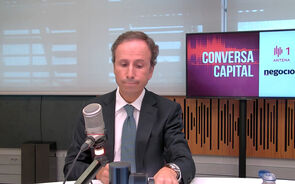Para quem está bear
2 mensagens
|Página 1 de 1
People ... just people
Isto não tem nada a ver com a tua previsão.
O bear market , neste momento, é um jogo que já não é jogado por patos inocentes. Ou pelo menos, já serão poucos.
Os inflows registados em fundos já é revelador, e a pastilha com que se têm feito resgates ...eheh.
---------------------------------------------------------------------
It's no surprise that the bear market has taken its toll, but the sheer intensity of investors' gloominess is remarkable. In the poll, conducted Dec. 6-9, more people than at any time in the last seven years predicted ultra-low long-run returns from stocks, more said a stock crash was "very likely," and more said real estate was likely to be a better investment than stocks. There were similar results for some newer questions: Fewer people say they've bought shares lately, fewer plan to buy any soon, and fewer are confident of their ability to beat the market.
To some observers, the dark mood of small investors is evidence that there's no foundation for a rally to build on. But contrarians argue just the opposite. They say that investors have probably already acted on their pessimism by dumping shares, so the market has nowhere to go but up. If they're right, it could be a good time to buy.
Whatever the interpretation, the facts are clear: After enduring a bear market for close to three years, investors are sick and tired of Wall Street. The poll asked the opinions of just over 1,000 people, including 575 who said they own stocks. It's a snapshot of what the average investor--not the professional--is thinking. The complete results are available at www.businessweek.com.
The most striking finding is the diminished expectations that investors have for long-run total returns from the stock market--capital gains and dividends combined. The portion of investors who expect total returns of less than 5% fluctuated in the single digits from 1996 to 2000 before jumping to 12% last year. This year the share in that most pessimistic category soared to fully 20%. Meanwhile, the group who expect at least 12% annual returns fell from 35% in 1998 to just 12% this year. In another cut at the issue, 36% of investors regard the stock market as overpriced even at today's depressed levels, vs. 19% who think stocks are cheap. Investors gave similar answers when asked about technology stocks and international stocks, with more describing them as overpriced than as cheap. Half of investors think terrorism and the war against it will affect the stock market somewhat or very negatively in the coming year, up from 40% who felt that way a year ago.
The bear market also seems to have made a dent in investors' confidence in their stock-picking skills. Most still think they can beat market averages. But fewer think so now than in the past. Ten percent are "very confident" and 54% are "somewhat confident" that their picks will top the market averages, down from 17% and 62%, respectively, in 2000. The share of those who are not at all confident of their market-beating ability is up to 8% from 3% in 2000.
Investors are acting on their dark convictions, too. Only 50% say they've bought stock or mutual-fund shares in the past 12 months, down from 57% who said so in 1999. And only 24% say they plan to invest "a lot" or "somewhat" more in stocks or mutual funds in the coming six months. That's down from 47% in 1999.
Each year we ask some questions of all households, not just ones in which people say they own stock. This broader group is equally negative. Over the next year, 56% say, another big crash in the stock market is very or somewhat likely. That ties 1997 for the highest level in the poll's history. (For what it's worth, the 1997 prediction panned out: The market did take a big tumble in the fall of 1998.) Only 41% expect stocks to go up in the year ahead. While that's in line with the level of the late 1990s, it's well down from the 52% who were expecting an up year 12 months ago.
Disillusioned by Wall Street, people seem to have hitched their hopes to real estate. Fully 53% of households named real estate as the single best investment choice. That is by far the most in the history of the poll, which covers 1989 and 1996-2002. (The runner-up year was 1989, at 40%.) Real estate has always been popular, probably because houses are the most valuable assets of most American families. Still, as recently as 1999, just 30% of respondents singled out real estate as the best investment. Mutual funds and common stock combined fell over the same period from 33% to a measly 14%. Stock-owning families tilted just as strongly toward real estate as households in general, with 55% picking it as their favorite choice and 19% opting for common stock or mutual funds.
What do these results imply for the fortunes of the stock market in the coming year? According to the bearish view, the poll shows that small investors have been so badly burned by the stock market that they won't come back anytime soon. They're more worried about getting fooled again than about missing a rally, this theory goes. And as long as the great mass of the investing public remains on the sidelines, the market will move mostly sideways. That's certainly the message you get from reading the poll results at face value.
But it's possible that reading the poll results literally will leave you standing on the platform as the rally train leaves the station. Contrarians see the miasma of pessimism as proof that investors have finally "capitulated"--that is, given up all hope. They see capitulation as a prerequisite for a rally, on the grounds that when there are no optimists left, there's no one left to drag the market down by turning pessimistic. At that stage--now, perhaps?--the only change possible is for some of the pessimists to turn optimistic, driving stock prices higher.
Meir Statman, a finance professor at Santa Clara University, sides with the contrarians in regarding the BusinessWeek/Harris Poll as a potential buy signal. "Sentiment is useful as a contrary indicator," says Statman. "I would not say from that that you should mortgage your house and jump into stocks, but I would say, don't join this overall pessimism."
In predicting trouble ahead, our poll respondents may be guilty of a common investing sin: assuming that what happened in the recent past will just keep on happening. "They're just grabbing at what they last saw or what they last experienced," says Frederick W. Stanske, a senior vice-president at Fuller & Thaler Asset Management Inc. in San Mateo, Calif. Ronald D. Peyton, CEO of San Francisco-based investment consulting firm Callan Associates Inc., questions respondents' views that real estate is a better investment today than the stock market is. Says Peyton: "There's more risk in real estate than there is in mutual funds at this point in the cycle."
No poll is going to reveal the next move for the stock market, of course. Prices are simply too unpredictable. But if you're looking for any edge you can find, it wouldn't hurt to chew over these results.
----------------------------------------------------------------
Na minha opinião, isto vale o que vale, ou seja, vale ZERO. O mercado não sobe ou desce em função destas sondagens.
O bear market , neste momento, é um jogo que já não é jogado por patos inocentes. Ou pelo menos, já serão poucos.
Os inflows registados em fundos já é revelador, e a pastilha com que se têm feito resgates ...eheh.
---------------------------------------------------------------------
It's no surprise that the bear market has taken its toll, but the sheer intensity of investors' gloominess is remarkable. In the poll, conducted Dec. 6-9, more people than at any time in the last seven years predicted ultra-low long-run returns from stocks, more said a stock crash was "very likely," and more said real estate was likely to be a better investment than stocks. There were similar results for some newer questions: Fewer people say they've bought shares lately, fewer plan to buy any soon, and fewer are confident of their ability to beat the market.
To some observers, the dark mood of small investors is evidence that there's no foundation for a rally to build on. But contrarians argue just the opposite. They say that investors have probably already acted on their pessimism by dumping shares, so the market has nowhere to go but up. If they're right, it could be a good time to buy.
Whatever the interpretation, the facts are clear: After enduring a bear market for close to three years, investors are sick and tired of Wall Street. The poll asked the opinions of just over 1,000 people, including 575 who said they own stocks. It's a snapshot of what the average investor--not the professional--is thinking. The complete results are available at www.businessweek.com.
The most striking finding is the diminished expectations that investors have for long-run total returns from the stock market--capital gains and dividends combined. The portion of investors who expect total returns of less than 5% fluctuated in the single digits from 1996 to 2000 before jumping to 12% last year. This year the share in that most pessimistic category soared to fully 20%. Meanwhile, the group who expect at least 12% annual returns fell from 35% in 1998 to just 12% this year. In another cut at the issue, 36% of investors regard the stock market as overpriced even at today's depressed levels, vs. 19% who think stocks are cheap. Investors gave similar answers when asked about technology stocks and international stocks, with more describing them as overpriced than as cheap. Half of investors think terrorism and the war against it will affect the stock market somewhat or very negatively in the coming year, up from 40% who felt that way a year ago.
The bear market also seems to have made a dent in investors' confidence in their stock-picking skills. Most still think they can beat market averages. But fewer think so now than in the past. Ten percent are "very confident" and 54% are "somewhat confident" that their picks will top the market averages, down from 17% and 62%, respectively, in 2000. The share of those who are not at all confident of their market-beating ability is up to 8% from 3% in 2000.
Investors are acting on their dark convictions, too. Only 50% say they've bought stock or mutual-fund shares in the past 12 months, down from 57% who said so in 1999. And only 24% say they plan to invest "a lot" or "somewhat" more in stocks or mutual funds in the coming six months. That's down from 47% in 1999.
Each year we ask some questions of all households, not just ones in which people say they own stock. This broader group is equally negative. Over the next year, 56% say, another big crash in the stock market is very or somewhat likely. That ties 1997 for the highest level in the poll's history. (For what it's worth, the 1997 prediction panned out: The market did take a big tumble in the fall of 1998.) Only 41% expect stocks to go up in the year ahead. While that's in line with the level of the late 1990s, it's well down from the 52% who were expecting an up year 12 months ago.
Disillusioned by Wall Street, people seem to have hitched their hopes to real estate. Fully 53% of households named real estate as the single best investment choice. That is by far the most in the history of the poll, which covers 1989 and 1996-2002. (The runner-up year was 1989, at 40%.) Real estate has always been popular, probably because houses are the most valuable assets of most American families. Still, as recently as 1999, just 30% of respondents singled out real estate as the best investment. Mutual funds and common stock combined fell over the same period from 33% to a measly 14%. Stock-owning families tilted just as strongly toward real estate as households in general, with 55% picking it as their favorite choice and 19% opting for common stock or mutual funds.
What do these results imply for the fortunes of the stock market in the coming year? According to the bearish view, the poll shows that small investors have been so badly burned by the stock market that they won't come back anytime soon. They're more worried about getting fooled again than about missing a rally, this theory goes. And as long as the great mass of the investing public remains on the sidelines, the market will move mostly sideways. That's certainly the message you get from reading the poll results at face value.
But it's possible that reading the poll results literally will leave you standing on the platform as the rally train leaves the station. Contrarians see the miasma of pessimism as proof that investors have finally "capitulated"--that is, given up all hope. They see capitulation as a prerequisite for a rally, on the grounds that when there are no optimists left, there's no one left to drag the market down by turning pessimistic. At that stage--now, perhaps?--the only change possible is for some of the pessimists to turn optimistic, driving stock prices higher.
Meir Statman, a finance professor at Santa Clara University, sides with the contrarians in regarding the BusinessWeek/Harris Poll as a potential buy signal. "Sentiment is useful as a contrary indicator," says Statman. "I would not say from that that you should mortgage your house and jump into stocks, but I would say, don't join this overall pessimism."
In predicting trouble ahead, our poll respondents may be guilty of a common investing sin: assuming that what happened in the recent past will just keep on happening. "They're just grabbing at what they last saw or what they last experienced," says Frederick W. Stanske, a senior vice-president at Fuller & Thaler Asset Management Inc. in San Mateo, Calif. Ronald D. Peyton, CEO of San Francisco-based investment consulting firm Callan Associates Inc., questions respondents' views that real estate is a better investment today than the stock market is. Says Peyton: "There's more risk in real estate than there is in mutual funds at this point in the cycle."
No poll is going to reveal the next move for the stock market, of course. Prices are simply too unpredictable. But if you're looking for any edge you can find, it wouldn't hurt to chew over these results.
----------------------------------------------------------------
Na minha opinião, isto vale o que vale, ou seja, vale ZERO. O mercado não sobe ou desce em função destas sondagens.
- Mensagens: 195
- Registado: 11/12/2002 2:48
- Localização: Paço de Arcos
Para quem está bear
Só vos deixo este gráfico, e amanhã deixarei as razões que me levam a acreditar que as subidas vão continuar depois desta retracção.
fig
fig
- Anexos
-
- a.gif (14.86 KiB) Visualizado 681 vezes
- Mensagens: 307
- Registado: 5/11/2002 1:51
2 mensagens
|Página 1 de 1
Quem está ligado:
Utilizadores a ver este Fórum: aaugustobb_69, blackrider71, Google [Bot], Google Feedfetcher, PAULOJOAO e 52 visitantes


